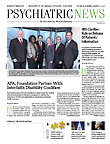During the past five years or so, the field of psychiatric genetics has exploded, experts in the field concur.
Whereas only a handful of gene variants that contribute to psychiatric illnesses had been identified before 2008, now close to 200 have, Jordan Smoller, M.D., Sc.D., a professor of psychiatry at Harvard Medical School and a psychiatric genetics expert, said in an interview. “They range from common variations that affect gene expression to rare variations in genes themselves to copy number variations that result in the deletion or duplication of chunks of DNA.”
The findings have been especially fruitful in schizophrenia and autism, Lynn DeLisi, M.D., reported. DeLisi, like Smoller, is a professor of psychiatry and a psychiatric genetics expert at Harvard. “I think that schizophrenia has been the most successful, and next to that, autism,” she said.
“We can now point to over 100 gene variants that have been consistently associated with schizophrenia,” Francis McMahon, M.D., chief of the Human Genetics Branch at the National Institute of Mental Health, added. “Several genetic variants that contribute to autism have been identified. But the big story on autism, really, has been the identification of gene copy number variations that contribute to the illness.”
There have been some salient findings in the domains of other mental illnesses as well—notably bipolar disorder, Ming Tsuang, M.D., Ph.D., Sc.D., pointed out. He is a professor of psychiatry and director of the Center for Behavioral Genomics at the University of California, San Diego. Some 40 gene variants have been linked with bipolar disorder, McMahon said.
Anomalies Found in Several Disorders
Also noteworthy is the discovery that some of the genetic anomalies common to one psychiatric disorder may also be present in others.
“Schizophrenia, the affective disorders, ADHD [attention-deficit/hyperactivity disorder], and autism all have some genes in common,” Tsuang said.
“You can find major gene copy number variations, such as the chromosome 22q deletion, not just in schizophrenia, but also in some other neurodevelopmental disorders, such as ADHD, autism, and intellectual disability,” noted Anne Bassett, M.D., a professor of psychiatry at the University of Toronto and a psychiatric genetics expert.
Moreover, the biological functions of some of the genetic anomalies underlying psychiatric disorders have been identified, and there have been some surprises.
“They are not the kinds of mechanisms that our understanding of the action of antidepressants or antipsychotic drugs would have led us to believe,” McMahon explained. “By and large the genes involved with the neurotransmitter systems do not show up . . . as playing an important role in risk for disease. What we are seeing instead are genes that are important in development, in the nervous system, and in development of the synapse.
“For example, one of the genes that have been implicated in bipolar disorder encodes calcium channels. And we know that calcium channels are important in a whole range of functions, including nerve development and the synapse. Also unexpectedly, genes located in the HLA region of chromosome 6—a region that contains genes crucial for immune function—appear to be implicated in schizophrenia.”
Even more provocatively, at least one clinical application of the psychiatric gene findings has emerged. It is now possible to clinically test for a few gene variants that contribute to autism spectrum disorder, Smoller stated. Psychiatrists and pediatricians who see children with neurodevelopmental disorders are starting to use such tests. However, these variants account for only a small fraction of cases—maybe 5 percent to 15 percent—he said.
Clinical Applications on Horizon
Indeed, such clinical findings are in their infancy at best, experts stressed. In fact, the best in psychiatric genetics is still to come, they said.
More gene variants or more gene copy number variations will be implicated in psychiatric disorders, Bassett predicted. Smoller agreed: “While we have already identified dozens of gene variants that contribute to schizophrenia, the latest estimates are that there may be as many as 8,000 that do so.”
Progress will be made in determining how certain genes actually create vulnerability to psychiatric illness, said Stephen Glatt, Ph.D., an associate professor of psychiatry and behavioral sciences at the State University of New York and a psychiatric geneticist. “Although we know the basic biology of some of the genes involved in psychiatric disorders, we still don’t know how specific mutations in these genes are actually causing illness.”
Psychiatric genetic discoveries will lead to new treatments for mental illnesses, McMahon anticipates. “I am hoping that within 10 years we will begin to have early testing of some drugs that are targeted at some of these genes and might ultimately be helpful for humans.”
For example, since calcium channels appear to be implicated in psychiatric illnesses, calcium channel blockers used to treat high blood pressure and heart disease might have therapeutic value in psychiatry as well, Smoller ventured. “Clinical trials are just starting to explore this possibility.”
Indeed, if McMahon could tell his psychiatric colleagues only one thing about the field of psychiatric genetics, it would be this, he said: “It’s coming fast! And you’d better know about it because it is going to be an important part of your clinical thinking, if it isn’t already.”
Bassett seconded McMahon’s position, adding: “Even though the psychiatric genetic literature can seem daunting, don’t be afraid of it, and don’t be afraid of working with genetics colleagues to try to understand your patients better.” ■

